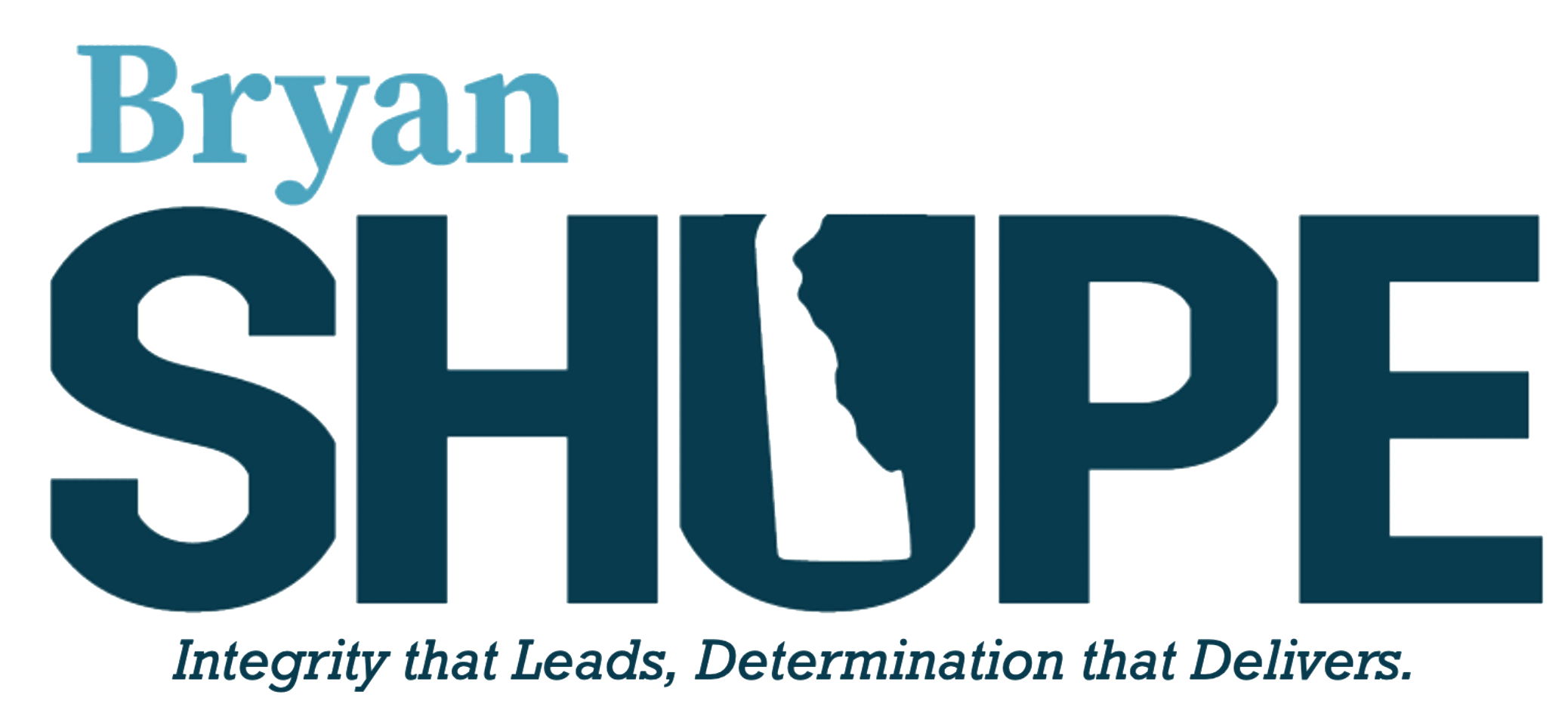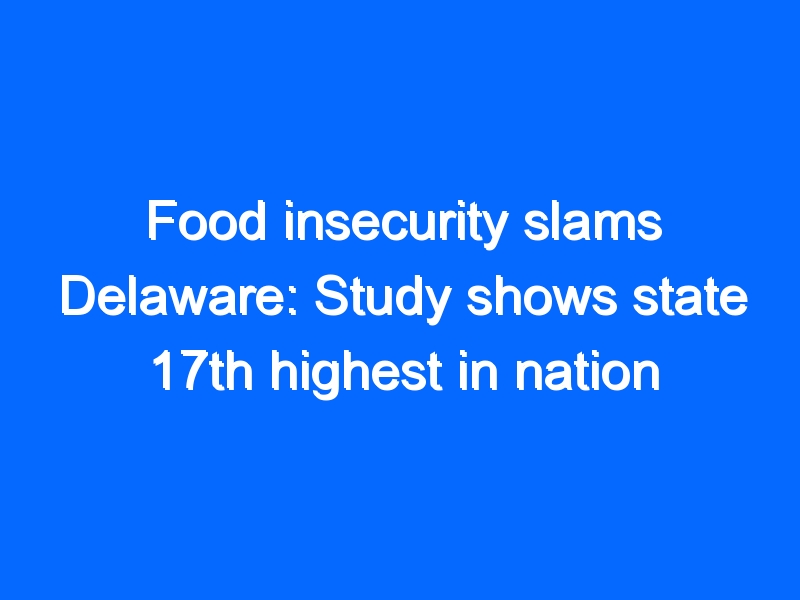
Jan 17th, 2021 · by Noah Zucker

As COVID-19 has racked the country, food insecurity has become a difficult side effect nationwide.
And Delaware is no exception.
According to Feeding America’s 2020 study on the impact COVID-19 has had on food insecurity in the United States, Delaware’s statewide projected food insecurity rate is 17.0%, up 4.4% from its 2018 rate of 12.6%.
That leaves Delaware with the 17th-highest rate in the country, between Florida and Alaska. At 22.6%, Mississippi has the highest projected rate of food insecurity nationwide for 2020.https://delawarestatenews.net/news/it-is-existing-not-living-growing-number-of-residents-struggling-with-livable-wage/embed/#?secret=rR6GgtxGa0Read part one of this two-part series
The U.S. Department of Agriculture (USDA) defines food insecurity as a lack of consistent access to enough food for an active, healthy life.
“We know that in a normal time, about 120,000 Delawareans would be experiencing food insecurity,” said Chad Robinson, community relations director for the Food Bank of Delaware. “With COVID, that number has gone up to about 171,000.”
He said this is “unprecedented” for the organization.
“We try to look year to year, but certainly, this year to last year, there’s no comparison,” Mr. Robinson said. “We’ve really just been kind of month to month.”
The increase in the rate of food insecurity in Delaware between 2018 and 2020 is lower than increases were in neighboring states like Pennsylvania and New Jersey, which have seen rates rise 4.5% and 4.9%, respectively.
Still, Delaware’s rate of increase over that period is higher than the rate in Maryland, which has seen just a 3.2% increase since 2018.

Mr. Robinson said the need for volunteers at the Food Bank of Delaware is ongoing, even during the health crisis.
“We have volunteer shifts every day in both of our facilities in Newark and Milford,” he said. “Depending on what the needs are, those volunteers could be sorting through donations, they could be packing boxes, they could be preparing backpacks for kids.”
The products the Food Bank of Delaware gets come from a variety of sources.
“The majority of our food comes from donations,” Mr. Robinson said, “from individuals, food drives, things like that.”
He said other food comes from retail partners like grocery stores and food distributors.
The Food Bank is “able to get a portion of what they have that maybe they can’t sell or is becoming closer to the end of its shelf life,” Mr. Robinson said.
“We also receive federal food products through the Temporary Food Assistance Program,” he said. “That’s a federal program where the government pushes food down to Food Banks and similar organizations across the country.”
The Food Bank of Delaware receives product via other federal agencies, as well.
“Right now, because of COVID, we are receiving some additional federal product through the Coronavirus Food Assistance Program,” Mr. Robinson said.
“For the last couple of years, we’ve also received additional food through trade mitigation,” he said. “This is product that the federal government is buying that normally could be sold to overseas markets, but because of trade wars and things like that, the federal government is buying that food product to keep farmers and growers functioning.”
Mr. Robinson said local partners are essential to the Food Bank of Delaware’s mission, too.
“We would be the state’s premier hunger-relief organization,” Mr. Robinson said, but “we have a number of partners (like) food pantries, food closets, soup kitchens, child nutrition sites, senior nutrition sites.”
“Those local group organizations that operate those pantries are really key,” he said.
“They’re the folks that are in the community doing that direct assistance, so it would be kind of inappropriate in a way for me to sit in my office here at the Food Bank and say that I know exactly where the needs are in a small community on the other side of the state,” Mr. Robinson said.
He added that those smaller groups know their locales best and what sort of food is wanted or needed.
“That local organization that has a food pantry or food closet and might be in that community knows their needs,” he said.
In communities across Delaware, churches have stepped up to the plate, too. On Halloween, Milford’s New Genesis Rock of Love Ministries held a food drive in a parking across from its building.

There, Senior Pastor Dupree Johnson was joined by other volunteers from the congregation and the community at large.
“We actually got the food from Vincent Farms — they’re located in Laurel — and the (U.S. Department of Agriculture) sponsored us, along with Love Inc.,” another Delaware-based Christian group, Pastor Johnson said.
“The government is supplying it, but they need people to distribute it,” he said. “They’re making the supply, (and) of course, the demand is increasing. However, the manpower to dispense it is something totally different. That’s where we come in.”
Pastor Johnson reached out to Rep. Bryan Shupe, R-Milford, for help staffing the event.
“I just put it out there through my networks and my friends,” Rep. Shupe said.
As a result of that outreach, members of Milford’s City Council and Planning Commission were there placing food in people’s cars. So was Greg Fuller, a U.S. Army veteran who was running for Rep. Shupe’s House seat at the time.
“I believe that we’re doing a great job as far as the Food Bank and those entities that are trying to feed folks, but we can always do better,” Mr. Fuller said.
As winter rolls in, Mr. Robinson expects the demand at Food Banks to increase statewide.
“There’s lots of various things that just put a strain on those limited resources, (and) those folks might have to decide exactly where they’re spending their money and what they need to spend their money (on),” he said. “I think some of those things in the winter are definitely exacerbated.”
He noted that the cost of heating and other utilities puts strain on many people’s budgets when it gets cold.
He added that many “folks … might have jobs that are more active in the summer months and might get laid off closer to the fall and winter time frame, construction and things of that nature.”
Rep. Shupe said those working in the food service industry have been hit hard, too.
“There’s a lot of people in the restaurant industry who are trying to find work at this time,” he said. “I think definitely the food industries are struggling a bit with summer being over. Obviously, because of tourism, people are going back to their home states.”
Rep. Shupe said the employment situation has started to worsen in his constituency.
“Definitely in the last few weeks, there are major concerns because of job losses,” he said. “We had a quite a few constituents that have had job losses in the last couple weeks or just uncertainty over what’s going to happen in the next year. I think a lot of people have uncertainties about what the economy is going to look like in 2021.”
Mr. Robinson added that holiday expectations also put pressure on people’s budgets going into the winter.
“It can’t be discounted, obviously, the holidays and folks wanting to do what they can for the Thanksgiving time frame and to be able to share that with their loved ones,” Mr. Robinson said. “Then, on Christmas, wanting to provide for the kids.”
Silver linings are hard to come by in a pandemic, but some say that the increased frequency of food insecurity has made it easier for people to talk about the issue.
“The reason why is the impact has been broad-based,” said Tom Dugan of Lincoln. “Everyone knows someone that either has contracted the virus or lost their job because of it, or their income is reduced because of it, so no, you don’t find the same stigma, and people aren’t relegating those who receive aid to the categories of freeloaders and loafers.”
He put a good deal of the onus for the current situation on Congress.
“What they need to do is just focus back on Washington in the Congress and the Senate, and they need to provide some relief (as soon as possible) for people, instead of playing politics with the whole situation,” Mr. Dugan said.
He said people need “financial relief in the form of direct payments and also payroll protection and getting people back to work.”
Milford’s Jennifer Cinelli was also at the food-distribution event. She used to live in Maryland and still has friends and family there.
She compared Delaware to that state, which has fared better than Delaware has when it comes to food insecurity.
“I think Maryland’s response was at a higher level. I think they were more prepared for something like this to happen,” she said. “Delaware’s response has been good. I have full respect for Gov. (John) Carney and his secretarial Cabinet. However, I think we can step it up.”
Ms. Cinelli was in Washington, D.C., on 9/11, and she said she views the pandemic through the prism of that disaster.
“I think with something like this happening, you’re not ready for it,” she said. “We weren’t ready on 9/11. We weren’t ready for this pandemic.”
After 9/11, she remembered that “everybody was going to give blood, and everybody was volunteering, and I see that now some, but not to the extent I did then.”


